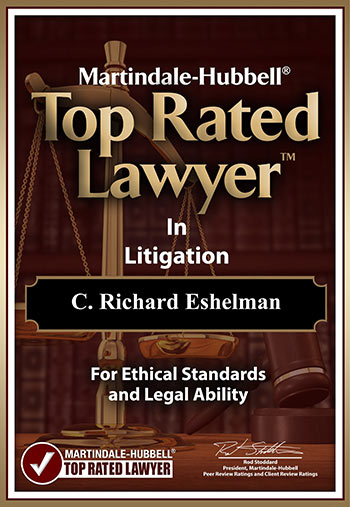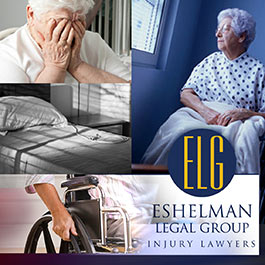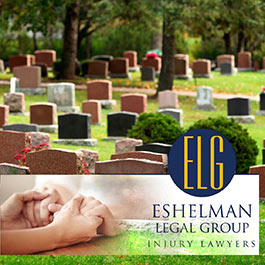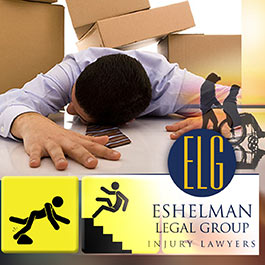Nursing Home Malpractice
In the United States today, there are over thirty six million people above the age of 65. According to statistics, many will need some form of assisted living, whether it is a nursing home, assisted living facility or other elderly facility. Due to the fact that long term care for the elderly is typically extremely expensive (well over $5,000 per month in many jurisdictions), the vast majority of residents go through most, if not all, of their assets in a matter of months and then become eligible for federal Medicaid benefits. Indeed, the cost of over 90% of nursing home residents is paid by Medicaid. As such, almost all nursing home facilities receive Medicaid funds.
According to the best available estimates, between 1 and 2 million Americans age 65 or older have been abused in some way or another. Nursing home residents have patient rights and certain protections under the law. Pursuant to 42 U.S.C.A. 1396r(c)(1)(B)(i), the nursing home must list and give all new residents a copy of these rights. Resident rights include but are not limited to:
- Respect: You have the right to be cared for in such a manner as to enhance your quality of life
- Services and Fees: You must be informed in writing about services and fees before you enter the nursing home
- Money: You have the right to manage your own money or to choose someone else you trust to do this for you
- Privacy: You have the right to privacy, and to keep and use your personal belongings and property as long as it doesn’t interfere with the rights, health, or safety of others
- Medical Care: You have the right to be informed about your medical condition, medications, and to see you own doctor. You also have the right to refuse medications and treatments
Whether a caregiver fails to meet the needs of the senior (neglect) or actually physically or mentally abuses a resident, nursing home abuse is not uncommon in today’s society, and we must do our best to prevent it. Recently, there has been increased recognition that elderly and dependent adults are subject to risks of abuse, neglect and abandonment. The abuse can be recurrent neglect or a single egregious event which produces injury, either physical or financial. There are several common types of injuries that are suffered as a result of recurrent neglect, including:
- Falls and fractures
- Physical or chemical restraints
- Malnutrition or dehydration
- Improper, wrong or over-medication
- Bed sores
- Lack of supervision (allowing residents to wander away from the facility)
- Physical abuse or unexplained injury
- Weight gain or loss
- Septic shock
- Gangrene
- Aspiration pneumonia
- Theft of money and personal property
- Unexpected or wrongful death
- Unsanitary conditions
- Untrained or insufficient staff
- Over-sedation
- Abandonment
- Substandard medical care
- Poor personal hygiene
- Defective equipment
- Sexual assault
The Federal statute, the Omnibus Budget Reconciliation Act or “OBRA” and its interpretive guidelines, spells out how nursing homes are ultimately responsible for the health, medical care and well-being of their residents. A federal bureau known as the Health Care Financing Administration oversees compliance with these regulations. HCFA enforces guidelines for the evaluation, care and treatment of residents, aimed at maximizing the quality of each resident’s daily life and minimizing abuse and neglect. If substantial compliance is shown, certification of the home is continued and the home can continue to receive government funds such as Medicare/Medicaid. If not, the home may lose its ability to receive these benefits. Care is expected to improve as nursing homes take steps to prevent injuries and avoid litigation, which is increasing.
Before proceeding with litigation, a review of the medical records is critical. All available family members, friends and witnesses should be interviewed to determine if there is any additional information regarding the elder’s treatment or documents which will assist in evaluation. This should include inquiries regarding complaints and/or third party investigations by governmental authorities. Because most victims in nursing home cases are long past the stage of earning wages and often have short life spans, analysis of these cases is different. Important factors which may impact the amount of damages that may be recovered include the egregiousness of the nursing home’s conduct, whether a pattern of neglect can be shown, and whether injuries from the nursing home’s negligence can be distinguished from the resident’s existing disease process.
The Eshelman Legal Group LLC is committed to upholding the quality of care in our long term care institutions by taking swift legal action to compensate nursing home residents and their families for injuries resulting from neglect or inadequate care. Only this way will the quality of care for all residents be assured.
Serving all N.E. Ohio & Columbus, Ohio
Investigate, Evaluate, Guide and Protect
The Eshelman Legal Group
Call: 1-800-365-0001
The Conclusion
The attorneys at the Eshelman Legal Group understand that no matter how cautious you are, others may not be so careful, and accidents do happen. So we hope you don’t need to, but if you are in a situation where you need the advice of an personal injury attorney, the Eshelman Legal Group is here to help you. For over 40 years we have been assisting accident victims, and we are here to assist you too... because “We’ll make things right.”
Ask yourself this question… who does the adjuster work for? The adjuster works for the insurance company, they do not work for you.
In all matters involving personal injury it is essential that measures be taken promptly to preserve evidence, investigate the accident in question, and file a lawsuit prior to the deadline imposed by the Statute of Limitations. If you or a loved one is a victim of personal injuries, call Eshelman Legal Group LLC, now at 1-800-365-0001. The initial consultation is free of charge, and if we agree to accept your case, we will work on a Contingent Fee basis, which means we get paid for our services only if there is a monetary award or recovery of funds. Don’t delay! You may have a valid claim and be entitled to compensation for your injuries, but a lawsuit must be filed before the statute of limitations expires. The above is not legal advice. That can only come from a qualified attorney who is familiar with all the facts and circumstances of a particular, specific case and the relevant law. See Terms of Use.







